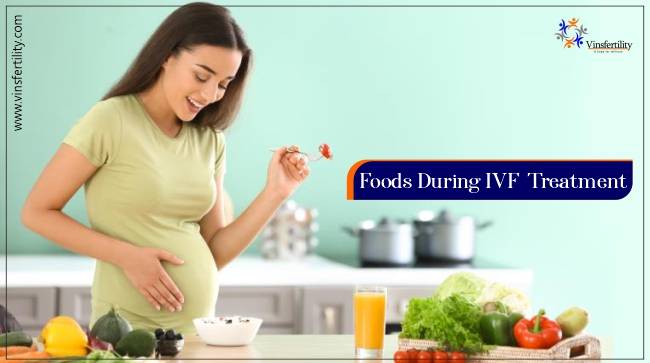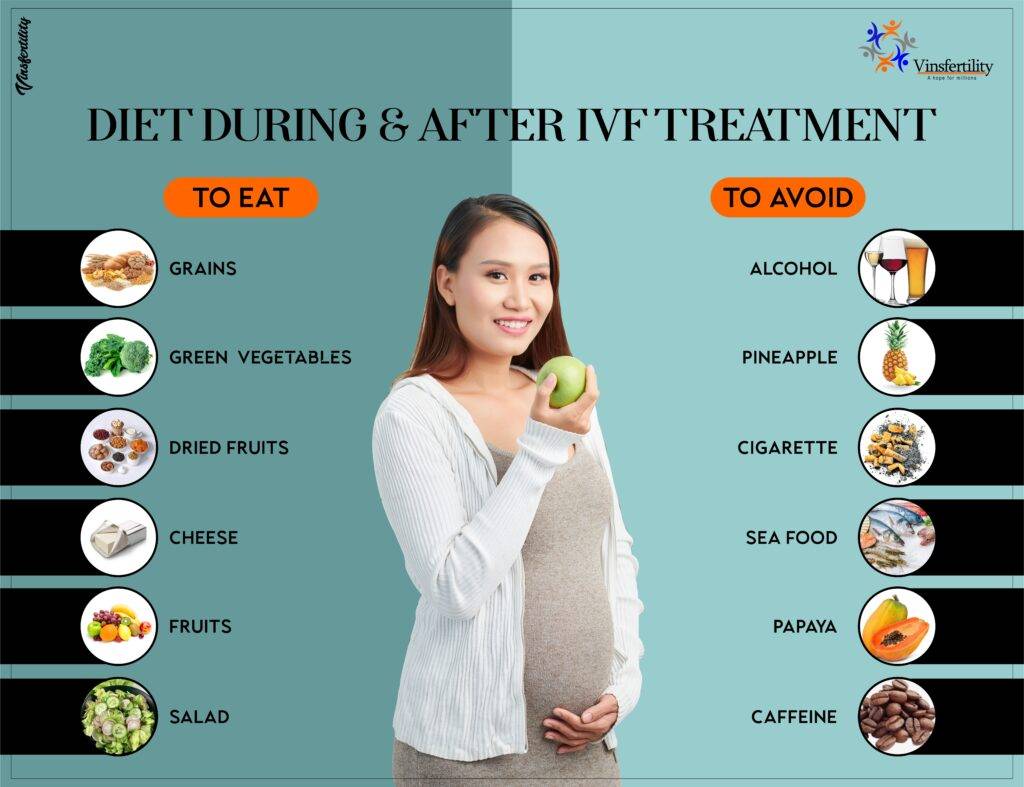
IVF Diet: Food To Eat During IVF Treatment & Food To Avoid After IVF Treatment
Diet During & After IVF Treatment
If you are ready to extend your family and start with the In Vitro Fertilization process, you may experience several emotions regarding the next step and about the whole process. These all mixed feelings are pretty common as IVF treatment can be time consuming, be physically exhausting and an expensive procedure. But with all this, one needs to take care of their health and body, which demands a well-balanced diet during & after IVF treatment:-
Best Food To Eat During IVF Treatment

It is really crucial for women to have healthy and balanced foods to eat before embryo transfer during IVF treatment. Throughout this time, you don't require to make big changes if you weren’t already.
Research manifest that a Mediterranean diet may refine the IVF success rate amid females who are thirty-five years old and who don’t have obesity. During an IVF treatment diet, motivate your partner to follow the Mediterranean diet with you.
Here are simple and quick ways to rebuild your nutrition with the Mediterranean diet:
- Replete on fresh vegetables and fruits.
- Plump for lean proteins.
- consume whole grains, like farro, whole grain pasta and quinoa.
- Add in legumes, including beans and chickpeas.
- Shift to low-fat dairy products.
- consume healthy fats, such as seeds, nuts, avocado, and extra-virgin olive oil.
- Neglect red meat, sugar, purified grains, and other mostly processed foods.
- Instead of salt, have seasoning foods with herbs and spices.
Fruits & Vegetables
- Potatoes:- It supports to escalate the cells partitioning in the body. Daily consumption of potatoes supplies necessary vitamins like B and E to your body.
- Green Leafy Vegetables:- Green Leafy Vegetables are rich in improving food. As these are ample in iron, antioxidants, and folic acid. Make them part of your everyday food ingestion.
- Salmon:- Abundant content of Omega-three fatty acids build this food a vital intake because it can support in Oestrogen balance and also heighten the blood flow. It should be appropriately cooked.
- Banana:- Filled with vitamin B6, this superfood assists in managing menstruation cycles. You can view this fruit as a healthy munch option because it yields you with adaptable options.
- Cabbage:- Filled with vital minerals and vitamins, the Di-indole methane available in cabbage supports in balancing the estrogen metabolism.
- Pineapple:- Pineapple carries a fine level of manganese in it. Manganese is familiar as a reproductive mineral and so it assists in the reproductive hormones.
- Broccoli:- As broccoli is great in Vitamin C, it assists in developing the eggs. Beside that rich iron content, anti-oxidants, and folic acid helps in the complete evolution of your fetus and body.
Best Diet after IVF Implantation
If we talk about food to eat after embryo transfer, we guide our IVF patients to have food as if they are already pregnant. If you do that then it will make certain optimal health and wellbeing from the very start of a possible pregnancy. Preferably, patients should be consuming healthy foods in the months which dominate into their IVF procedure.
Fresh vegetables and fruits are always best for an IVF patient, but contemplate the following produce following IVF:
- Bananas
- Beets
- Berries
- Broccoli
- Dates
- Leafy greens
- Sprouts
- Sweet potatoes
For protein, think about the following nutritious and lean sources, most of which are high in fiber or ampled with healthy omega-3 fatty acids:
- Anchovies
- Beans
- Eggs
- Hummus
- Nuts
- Salmon
- Sardines
- Seeds
- Yogurt
If everything goes properly to plan, for the next nine months, you will be developing a tiny human inside your body. This is the perfect time to welcome the healthy eating habits that experts suggest to pregnant females.
Preferably, you’ll desire to eat a variety of vegetables and fruits, as well as foods lavish in calcium, protein, B vitamins, and iron. Even if you’re consuming healthy food, though, go ahead and add a prenatal vitamin to your practice.
Foods and Beverages To Avoid After IVF
After IVF, it’s advisable to avoid having alcohol and sodas. The alcohol and the high sugar content are poor for your health and harmful for the embryo that’s been inserted.
We also guide patients to keep away from processed foods, junk food, processed meats, and soft cheeses. These are apt to be inadequate for general health and wellness due to fillers and preservatives.
While fish is the best source of protein and healthy fats, you’ll want to steer clear from fish and seafood with an increased mercury content. That includes sea bass, tuna and mackerel.
Make sure to ask the doctor about any vitamins or dietary supplements during the IVF treatment. It may not usually be an issue, but it’s preferable to be cautious than sorry when it comes to the numerous substances you’re proceeding with and how they could possibly influence a pregnancy.
[WPSM_AC id=16135]


